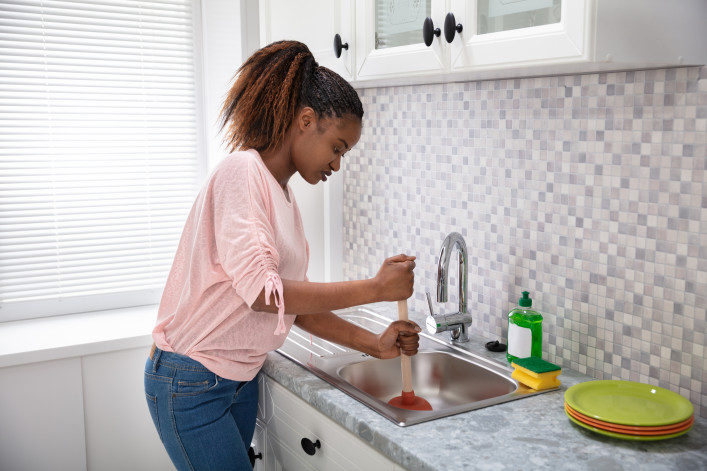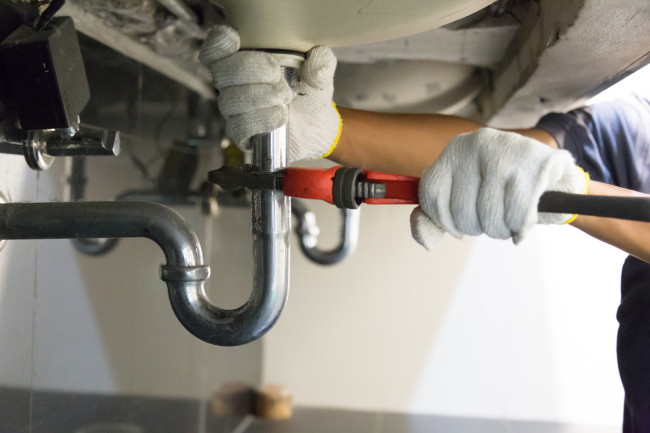Who is responsible for fixing a clogged drain, you or your landlord?
- Most plumbing problems are a landlord's responsibility unless they are caused by the tenant
- Using inexpensive drain caps or mesh covers to catch debris is an easy way to keep pipes clear

Some minor plumbing problems can be handled yourself.
iStock
The shower in my NYC rental apartment is starting to back up. Am I responsible for clearing a clogged bathroom drain, or is that the super’s job?
Many residential buildings in New York City—and their plumbing systems—have been around for decades, so it’s almost inevitable that you’ll deal with a clogged bathroom drain at some point. When that happens, your shower can quickly go from relaxing to frustrating as water begins pooling around your feet.
If you own your apartment, the problem (and the fix) falls squarely on you. But one advantage of renting is that your landlord is typically required to address these types of issues.
[Editor's Note: Realty Bites tackles your NYC rental questions. Have a query for our experts? Drop us an email. We respect all requests for anonymity. An earlier version of this post was published in November 2024. We are presenting it with updated information for November 2025.]
Whether a clogged drain qualifies as a repair that your landlord must make depends on the circumstances, although the short answer is yes.
Generally speaking, landlords are legally required to repair or replace any structural components, including plumbing, provided the clog is due to normal wear and tear, aging pipes, or building-wide plumbing issues. And under the warranty of habitability, landlords must keep plumbing in good working order. A chronically slow or clogged drain may violate this rule.
Arik Lifshitz, CEO of DSA Property Group, said that while a clogged drain is usually the landlord's responsibility, that doesn’t mean a tenant can’t do a better job of reducing or preventing the backup from happening in the first place.
"Anything that can be cleaned without the use of a 'snake' or other specialized tool should be done regularly by the tenant," he noted, such as purchasing a drain cap or mesh cover (they’re very cheap) to catch more hair and debris before it goes down the drain.
"But ultimately, if a snake is needed to clean out a clog, it’s the landlord’s responsibility," Lifshitz says. First, this prevents a novice from damaging the plumbing by using the tool incorrectly. Additionally, it would be unreasonable to expect a tenant to repair the drain beyond a certain point within the necessary timeframe and in the proper manner to prevent plumbing issues throughout the building.
"There are always exceptions to every rule, and I can imagine egregious situations on both sides that would cause one or the other party to be liable," he said.
That caveat would include instances where the drain becomes clogged due to tenant negligence or malicious intent, and if there's proof of that, a landlord could conceivably charge the tenant. A consistent pattern of clogs would also be a red flag, especially if your landlord has already explained that whatever you are doing is not allowed.
| Who is responsible for fixing a clogged drain? | |
|---|---|
| Landlord/super |
|
| Tenant |
|
| What can happen |
|
So while most landlords are understanding and know backups happen, if (for example) they pull your kid's bath toys or other items that don’t belong out of the pipes more than once, don’t be surprised they ask for a reimbursement—or, in extreme cases, refuse to renew your lease or even move to evict.
Furthermore, you can get into trouble if you repeatedly flush items down the toilet that are not meant to be flushed, such as paper towels, "flushable" wipes, or hygiene products.
The same goes for pouring non-dissolvable items, such as grease or food fat, down the kitchen drain (or into the toilet).
When plumbing problems go very wrong
Lest you wonder what could happen, improperly disposed of cooking grease was to blame for the infamous Queens "fatberg" of 2017, which resulted in major sewer backups. On that note, the city’s Department of Environmental Protection advises that the correct way to dispose of cooking grease is to put it in a sealed container (such as a yogurt container or take-out soup container) with your regular garbage. The DEP also advises using paper towels to wipe away any residual grease or oil from your dishes, pots, and pans before washing them.
Most leases don't contain any language regarding this situation. However, some agreements include provisions like: "Tenant shall keep drains clear and be responsible for clogs caused by tenant’s actions."
What you can and should do
Whenever you have a clogged drain, try loosening it with a plunger or by using an enzyme cleaner (avoid Drano—it can damage pipes). If that fails to work, notify your landlord in writing, whether by email or text, with photos or a video showing the extent of the problem.
Landlords will often send a plumber and then bill the tenant. If this happens, request a plumber’s report showing the cause before making any payment.
Should the landlord refuse to fix it, and the clog is not your fault, tenants are advised to call 311 for "sinks, bathtubs, showers, toilets, or other plumbing fixtures that are broken or defective."
—Earlier versions of this article contained reporting and writing by Nikki M. Mascali.




























